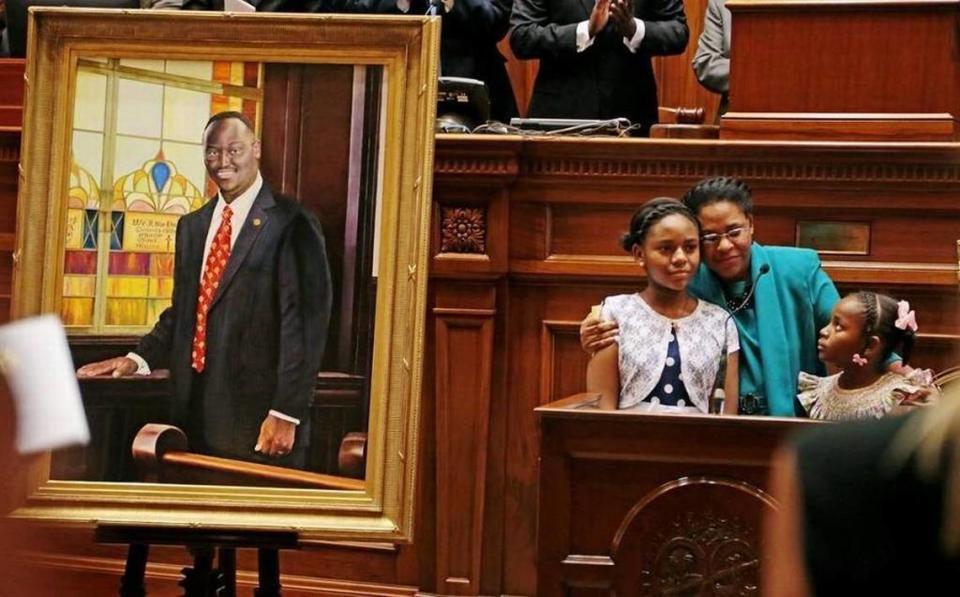‘Can’t bring my father back’: What the Emanuel settlement means to the Pinckney family
Malana Pinckney was just 6 years old when she hid under a desk with her mother as a white supremacist killed her father.
Six years old when bullets sprayed through the basement of downtown Charleston’s Emanuel AME Church during a Wednesday night Bible study, killing nine Black parishioners inside the historic church.
Six years old when her mother put a hand over her mouth while she called 911 and begged the operator in a trembling whisper, “Please hurry.”
But on Thursday, the 12-year-old stood outside the Department of Justice in Washington, D.C., to speak about her dad, the Rev. Clementa Pinckney, after the federal government announced it would pay $88 million to settle a case brought by survivors and the families of the nine Charleston church shooting victims murdered by a white supremacist in 2015.
“I didn’t know that my father was such a big inspiration to people all over the world,” she said, her voice wavering a little as she stood in front of a cluster of microphones.
Then, the young woman reached for hope, in many ways channeling the prayerful spirit of her father, a former state senator and pastor.
“Just because you came from nothing, doesn’t mean that you can’t be something,” she said before stepping back from the microphones to walk back to her mother’s side.
Malana was the first of three Pinckney women who spoke at length Thursday afternoon during a press conference shortly after the wrongful death settlement total was announced.
The lawsuits alleged that the FBI was negligent when the agency performed a background check on the killer, Dylann Roof, who managed to buy a gun he should never have been allowed to legally obtain.
The shooter, who was found guilty and sentenced to death in federal court in January 2017, had an arrest record for drug use — a prohibiting factor that should have blocked him from buying any gun. However, under current federal law, a gun sale can move forward if a background check isn’t completed within three days.
Because the background check took longer than the three-day window, Roof was able to buy the .45-caliber Glock pistol at a West Columbia gun shop. Two months later, he used that gun to kill nine people, including the Rev. Pinckney, in the 2015 hate crime at Mother Emanuel Church.
After the massacre, this crack in the federal background check system became known as “the Charleston loophole.”
In their remarks, though, the Pinckney women did not call for gun reform or policy changes — something they have done in the past. They instead reiterated that their lives are now lived without a beloved father and husband.
“It’s already so hard to lose someone you love, but it’s even harder to grow up without a father knowing that he lost his life in a place that he devoted his entire life to,” said Eliana Pinckney, the eldest daughter of Clementa Pinckney.
The 17-year-old continued, “That is something that is so hard to grasp with and so hard to understand, and so hard to grow from. But it’s so important that I’ve had a community behind me who has helped get to the place that I am now. No amount of compensation will ever replace my father’s life.”
Money, she later said, is not happiness.
“This is not going to bring my father back,” she said.
Instead, the young woman said the financial compensation will help to keep her father’s legacy alive.
But when Jennifer Pinckney, their mother, stepped up the microphones, she shared that she sees her husband and his legacy living on in their girls.
“I always tell everyone that I have the best of both worlds. One child looked looks like Clementa, and the other one acts like Clementa,” she said. “And so I always say that I have Clementa right here to talk to me, to look at me and so forth.”
She also said she knew her husband was looking down on them, smiling.
“He will always have my heart, and I’ll always love him,” Jennifer Pinckney said.
Then, she looked up, blew a kiss to the heavens and said, “I love you.”
The $88 million settlement is one of the largest settlements ever made by the federal government in a collection of civil rights cases.
But Jennifer Pinckney said in an impassioned speech that she will never forget what happened. She said she lives with the massacre every day, and her daughters know the anxiety and crying is still there.
Now, she said, she takes it each day at a time and tries to stay strong for her daughters.
“Yes, there is a settlement. And, you know, I don’t think about that,” she told reporters. “If I had the opportunity to bring Clementa back, I’d switch. You can all take the settlement. Bring my husband back to me, bring their father back to them.”

 Yahoo Movies
Yahoo Movies 


